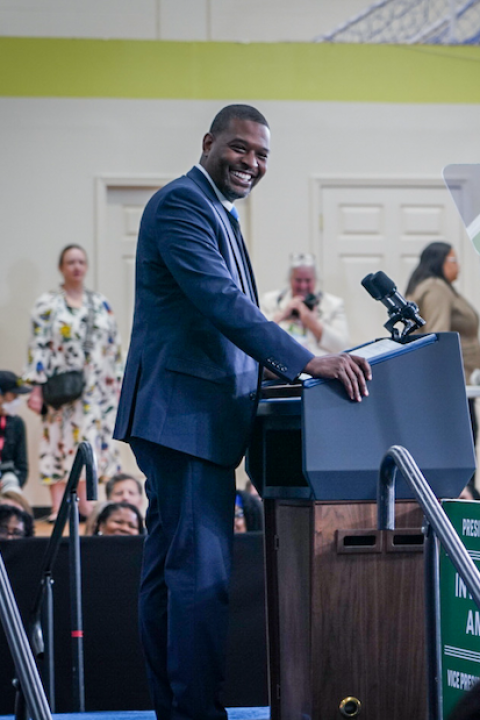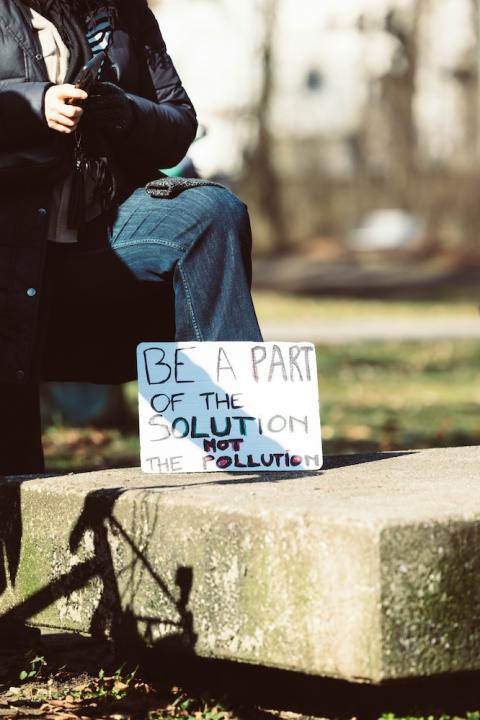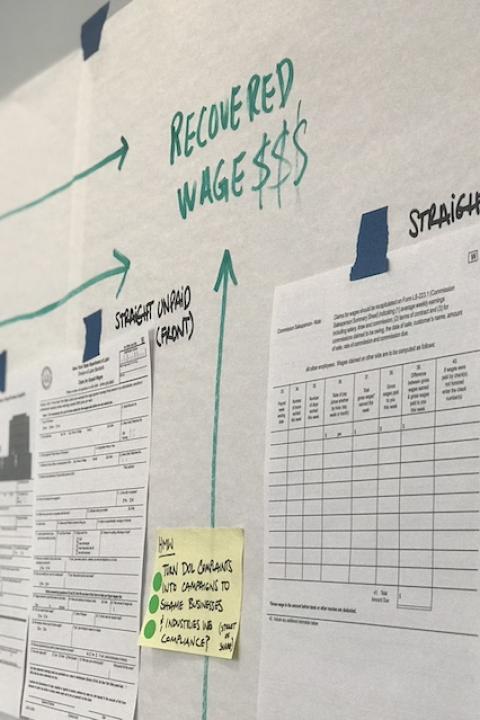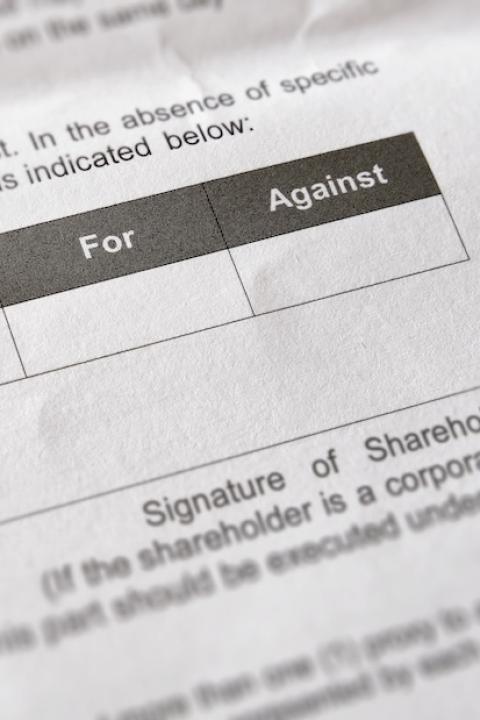
A rendering of the auditorium and classroom space at the New York Climate Exchange. The planned $700 million laboratory for climate solutions on New York City’s Governors Island is a collaboration between the city government, technical universities and companies, in a sign that corporate climate action can have an impact even amidst "anti-ESG" backlash. (Image: Skidmore, Owings & Merril)
Corporate action on climate change and other social and environmental issues has become a political football in the U.S. The term ESG in particular, which refers to corporate environmental, social and governance principles, is now a flashpoint for many critics. In response, some corporate leaders have stopped referring directly to ESG principles, but that doesn't mean they've stopped acting on them.
ESG by any other name
Anti-ESG rhetoric became a familiar fixture on the U.S. political scene over the past two years. It’s often mixed with racially tinged references to “woke capitalism,” and it is also linked to new state legislation aimed at protecting fossil fuel interests.
The law firm K&L Gates is among those tracking the spread of ESG-related legislation in the U.S. It identified 22 states adopting some form of “anti-ESG” laws, many within the 2023 legislative session.
The negative attention has prompted a change in the way that some firms discuss ESG goals and principles. One high-profile example is Larry Fink, CEO of the leading investment firm BlackRock. Speaking at the Aspen Ideas Festival in June, Fink cited politicization as the reason he stopped using the term ESG, though he said BlackRock hasn't changed its stance on ESG issues, Reuters reported.
Other experts in the field agree. The controversy over ESG is “clearly a theme in media and politics,” said Marjella Lecourt-Alma, CEO and co-founder of London-based Datamaran, an ESG platform powered by artificial intelligence. “But when we talk to our corporate clients in the U.S., it’s not really an issue. Some of them say they watch their words a little bit, but in terms of ESG risks and opportunities, we talk about biodiversity, climate risk, human rights, supply chain — then all of a sudden you are talking about business.”
Economies already lose hundreds of billions of dollars each year to natural disasters and other weather-related impacts that are worsened by climate change. Couple that with trillions in losses tied to economic inequality, and external issues become business risks that are difficult to ignore. “What is most important to the business remains the key driver,” Lecourt-Alma said. “Business leaders realize there are things happening outside of their business that are impacting their business, and they need to step up and internalize it.”
That tracks with a recent Bloomberg survey involving 300 of its terminal users. “Bankers, money managers and other financial market participants are starting to loathe the label ‘ESG’ — but they’re also sticking with the strategy,” the outlet reported in August.

Actions speak louder with a public-private climate lab in New York
In this context, the New York Climate Exchange is a powerful example of how businesses can take meaningful action on climate change, regardless of political headwinds.
The Exchange was formally announced in April as a new institution tasked with developing climate solutions. The effort is spearheaded by Stony Brook University, the flagship research institution of the State University of New York, in partnership with IBM, and its collaborative model engages businesses, academic institutions and governments.
Joining IBM as a core corporate partner is the global firm Boston Consulting Group. Moody’s also signed on as an affiliate partner, and the Stockholm-based sustainable development firm Urban Systems is participating in an advisory capacity. The New York City business community is also represented by the Chambers of Commerce from the Bronx, Brooklyn, Manhattan, Queens and Staten Island.
A combined $150 million pledge from Bloomberg Philanthropies and the Simons Foundation will go toward setting up the Exchange in a new $700 million facility on Governor’s Island in New York City, expected to open in 2028.
The Exchange “will be a first-of-its kind international center for developing and deploying dynamic solutions to our global climate crisis, while also acting as a hub for New Yorkers to benefit from the rapidly evolving green economy," Stony Brook's website reads.
IBM will work with the university on job training and climate research programs at the Exchange. That includes a planned Sustainability Accelerator for social impact programs focused on the application of IBM technologies to help people who are vulnerable to climate impacts and other environmental threats.

The push to make New York City a "living laboratory" for global climate solutions
In another early indication of the potential for the Exchange, the prominent climate policy and finance expert Stephen Hammer was named as the founding CEO of the new institution in November.
Stony Brook expects the Exchange to reflect and amplify Hammer’s 10-year experience as a senior policy advisor on urban-scale climate solutions at the World Bank, where he is credited with an instrumental role in incorporating climate change into the bank’s lending practices.
“The Exchange is not just another institute — it’s part think tank, part do-tank — serving as a training ground for the climate leaders of tomorrow and an incubator for technology and market entrepreneurs,” Hammer said in a press statement. “It’s meant to innovate and have an impact, to defend science, and to make New York City a living laboratory for international solutions."
Next steps for high impact
Through Stony Brook and other high-profile partners including Brookhaven National Laboratory, Georgia Tech and Oxford University, the Exchange could contribute to a positive snowball effect. “There are a lot of businesses today that are starting to benefit from new innovations around clean energy and water technology,” said Lecourt-Alma of Datamaran. “They get funding, and they become the new industry leaders.”
As for the future of ESG, that depends partly on the ability of businesses to fill their ESG staff positions. Taking note of the ongoing ESG skills gap, Lecourt-Alma advocates for a strategic, data-driven approach. Software that leverages artificial intelligence, such as Datamaran's own offering, can reduce work time while allowing companies to clearly track their progress, plan their actions, and establish governance mechanisms to hold leadership accountable, she said.
Business leaders need to ask themselves key questions including how the company is organized, who is in charge, and how it internalizes ESG principles, Lecourt-Alma advised. “The smart way to ESG starts with governance, not compliance,” she said.

Tina writes frequently for TriplePundit and other websites, with a focus on military, government and corporate sustainability, clean tech research and emerging energy technologies. She is a former Deputy Director of Public Affairs of the New York City Department of Environmental Protection, and author of books and articles on recycling and other conservation themes.














